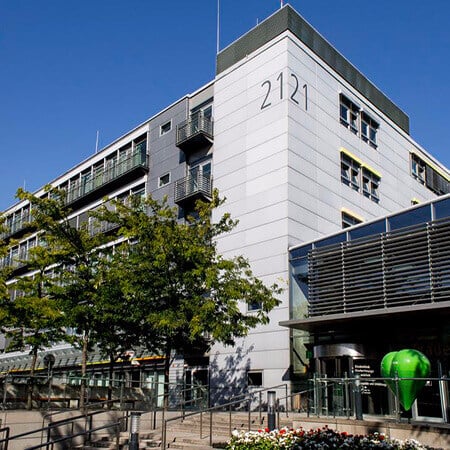Rectal Cancer — CRS and HIPEC - Hyperthermic Intraperitoneal Chemoperfusion: treatment in the Best Hospitals of Germany
Treatment prices are regulated by national law of the corresponding countries, but can also include additional hospital coefficients. In order to receive the individual cost calculation, please send us the request and medical records.

Department of General, Abdominal, Transplant, Hepatopancreatobiliary, Colorectal, Endocrine, Bariatric Surgery and Hernia Surgery
The Department of General, Abdominal, Transplant, Hepatopancreatobiliary, Colorectal, Endocrine, Bariatric Surgery and Hernia Surgery provides the full range of services in the areas of its specialization and holds a leading position at the national and international levels in terms of the number of surgical interventions performed and their success. Of particular interest are operations for treating diseases of the bowel, stomach, esophagus, pancreas, liver, gallbladder, and bile ducts, and endocrine glands. The department's doctors have excellent skills in the surgical treatment of cancer, surgery for liver, kidney, pancreas, and small intestine transplants, and operations for morbid obesity. The department's operating rooms are the pride of the medical facility, since they have all the necessary technical options for performing operations with the da Vinci surgical system, image-guided interventions, and endoscopic surgical procedures, which are characterized by minimal trauma rates.







Department of General and Abdominal Surgery, Hepatopancreatobiliary Surgery, Colorectal Surgery, Endocrine Surgery, Hernia Surgery and Bariatric Surgery
The Department of General and Abdominal Surgery, Hepatopancreatobiliary Surgery, Colorectal Surgery, Endocrine Surgery, Hernia Surgery and Bariatric Surgery offers the full range of effective surgical treatments in accordance with modern medical standards. Operations of varying complexity are performed on the stomach, colon, pancreas, liver, gallbladder, bile ducts, rectum, thyroid gland, and parathyroid glands in the department's operating rooms every day. The department's primary focus is the surgical treatment of malignant gastrointestinal tumors. The medical facility is certified in this area by the German Cancer Society (DKG). The team of endocrine surgeons specializes in the treatment of diseases of the thyroid gland, parathyroid glands, and adrenal glands. Patients with morbid obesity are also successfully operated on here. In their work, the department’s specialists primarily use minimally invasive surgical techniques, which virtually eliminate trauma to healthy tissue during the intervention. The department's operating suite is equipped with an innovative da Vinci Surgical System, which allows the doctors to perform sparing and high-precision surgical interventions. The specialists of the medical facility strictly adhere to hygiene and safety standards and create the most comfortable conditions for each patient during their hospital stays.







Department of Abdominal and Colorectal Surgery, Hepatobiliary Surgery, Hernia Surgery, Bariatric Surgery, Endocrine Surgery, Thoracic and Vascular Surgery
The Department of Abdominal and Colorectal Surgery, Hepatobiliary Surgery, Hernia Surgery, Bariatric Surgery, Endocrine Surgery, Thoracic and Vascular Surgery offers the full range of services in these medical fields. It provides surgical treatment of diseases of the gastrointestinal tract, thyroid and parathyroid glands, thoracic organs, vascular system, rectum, anus and colon. In addition, the department performs bariatric interventions for the treatment of morbid obesity. A special focus is made on the treatment of gastrointestinal cancer. Minimally invasive surgical techniques are always preferred, if clinically indicated. The team of the department's surgeons has 8 progressive operating rooms equipped with everything necessary for successful treatment. The department also has the da Vinci Xi surgical system for high-precision minimally invasive robot-assisted interventions. The patient's health is in the safe hands of the best German surgeons who have gone through a rigorous selection and have vast clinical experience.






Rectal cancer is a tumor of the descending (lower) colon. It is an aggressive type of cancer with a poor prognosis, but in countries with developed medicine, the disease can be successfully treated even in its advanced stages. If the tumor has spread to the abdominal cavity, doctors perform cytoreductive surgery (CRS) followed by hyperthermic intraperitoneal chemotherapy (HIPEC). This advanced technique is available at the leading German Cancer Centers.
Content
- Who may be a candidate for CRS/HIPEC for rectal cancer?
- How is CRS/HIPEC performed for rectal cancer?
- CRS and HIPEC results for rectal cancer
- Rectal cancer treatment in German hospitals
Who may be a candidate for CRS/HIPEC for rectal cancer?
Colon cancer that has spread to the peritoneum is one of the most common indications for cytoreductive surgery with subsequent hyperthermic intraperitoneal chemotherapy. Colorectal cancer includes two similar in origin but clinically different types of diseases, such as colon cancer and rectal cancer. Rectal cancer is characterized by a more aggressive course and a worse prognosis.
CRS and HIPEC can be used to treat this disease in cases where metastases have appeared in the peritoneum. It is also possible to use intraperitoneal chemotherapy after a pelvic exenteration for a locally advanced or recurrent tumor.
If a patient has peritoneal carcinomatosis, the best results can be achieved when the pelvic organs are not affected. However, if these organs are involved in the cancer process, it is not considered a contraindication to surgical treatment. Cytoreductive surgery and HIPEC can still be used, but the surgical intervention becomes more complex.
How is CRS/HIPEC performed for rectal cancer?
CRS and HIPEC are complex treatments. This surgery lasts up to 10 hours and sometimes even longer. To get good results, it is better to undergo treatment in a good hospital, preferably in a country with developed medicine.
Cytoreductive surgery means that doctors aim to shrink the tumor size as much as possible. Unlike radical surgery, which is used in the early stages, the surgeon does not have the task of curing cancer.
When performing the operation, surgeons remove the part of the intestine affected by the tumor process, lymph nodes, and, if necessary, adjacent pelvic organs. A thorough examination of the abdominal cavity is done, and all the affected areas of the peritoneum are removed. Partial removal of the involved organs may also be performed. During the operation, doctors strive to achieve complete cytoreduction. This means that no tumor that can be seen with the naked eye remains after surgery.
The final stage of surgery involves intraperitoneal hyperthermic chemotherapy. Doctors place drainage tubes in the abdominal cavity. One set of drainage tubes is used to administer a solution containing chemotherapeutic agents, while another set allows it to drain out. This solution contains a high dose of cytostatic drugs, up to 10-20 times higher than the concentration in the blood after an intravenous administration. As a result, cancer cells die quickly and cannot recover. Heating the solution enhances the action of the drugs, allowing them to penetrate deeper into tumor foci, up to 2-3 mm. The procedure results in the destruction of the remaining cancer cells in the abdominal cavity, which makes it possible to achieve a long-term remission of the cancer.
CRS and HIPEC results for rectal cancer
Rectal cancer is a more aggressive disease than colon cancer. Survival rates for this pathology are therefore worse, despite medical advances.
In the study of M. Tonello, which was carried out at the MD Anderson Cancer Center in Madrid (Spain), doctors assessed the effectiveness of treatment for colorectal cancer with spread to the peritoneum. All patients underwent cytoreductive surgery with subsequent hyperthermic intraperitoneal chemotherapy. The median survival rate for colon cancer was 48 months, while for rectal cancer, it was 22 months, which is almost two years. The three-year survival rate in this study was 20%.
Doctors from Basel, Switzerland, tried to improve these results. In a study by Vincent C. J. van de Vlasakker, 30 patients with advanced stages and recurrences of rectal cancer were treated with three methods at once: first, cytoreductive surgery was performed, followed by intraoperative radiation therapy and hyperthermic intraperitoneal chemotherapy. A median survival rate of 31 months was achieved.
Thus, CRS and HIPEC are effective treatment methods for rectal cancer, even in the advanced stages. Such a treatment is available in specialized hospitals in countries with developed medicine for strictly selected categories of patients. The procedure does not cure cancer, but it can give a person several years of life.
Rectal cancer treatment in German hospitals
Only countries with developed medicine apply advanced treatment methods for rectal cancer, such as CRS/HIPEC. You can undergo hyperthermic intraperitoneal chemotherapy in Germany. Leading hospitals in this country have vast experience using this technique, so you can count on good results with a low risk of complications.
You can find out the cost of treatment in Germany and make an appointment at one of the leading hospitals through the Booking Health website. On the website, you can find the current cost of procedures and sort hospitals by cost or other parameters to choose the best center. The cost of CRS and hyperthermic intraperitoneal chemotherapy (HIPEC) for rectal cancer is between 52,120 EUR and 91,970 EUR. The Booking Health specialists will help you choose the most suitable hospital in Germany with the best ratio of cost and quality of medical services.
We will help you undergo your treatment in Germany faster and on your preferred dates. When you make your treatment appointment through the Booking Health website, the cost of the medical care program will be lower than when you seek medical help directly from a hospital in Germany. Prices for treatment in Germany will be lower due to the absence of additional fees for foreign patients. If you make your appointment for treatment in Germany through our service, you will receive insurance that will cover the cost of additional medical services if they are needed. Thus, the initial cost of your medical care program will not change under any circumstances, and you will be able to confidently plan your expenses for medical services.
Authors:
The article was edited by medical experts, board-certified doctors Dr. Vadim Zhiliuk and Dr. Nadezhda Ivanisova. For the treatment of the conditions referred to in the article, you must consult a doctor; the information in the article is not intended for self-medication!
Sources:

